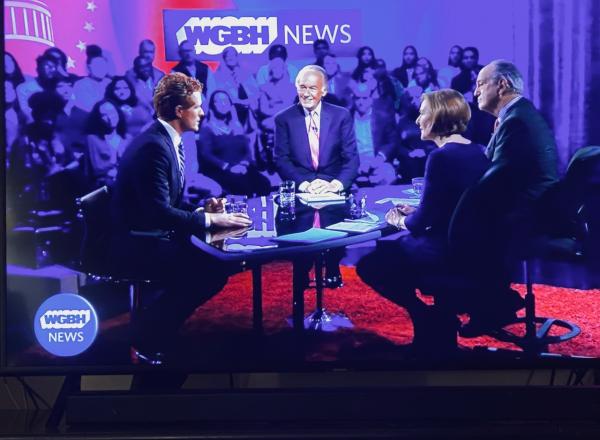February 19, 2020

Senator Edward Markey and Rep. Joseph Kennedy III made a joint appearance in a one hour debate telecast on WGBH-TV Tuesday, Feb 18, 2020
By Tom Mulvoy, Associate Editor
February 19, 2020
When Joseph P. Kennedy III was born in the fall of 1980, Edward J. Markey was a month away from winning a third term in the US House of Representatives. Some 40 years later, the two men are engaged in a contest for the seat that Markey now holds in the US Senate, with Kennedy, the son of a congressman, the grandson of a US senator, and the great-nephew of two other US senators, one of whom was also president, running a primary campaign against his fellow Democrat while sitting in the US House on the other side of the Capitol building.
On Tuesday night, the candidates sat down with moderators Margery Eagan and Jim Braude in a televised talk-a-thon on WGBH-TV that offered voters their first chance at seeing the two legislators grapple over issues, which proved to be no mean feat since broadly speaking they are in agreement on many of the key matters of the day.
For Kennedy, the first question posed to him was from Eagan, who mentioned a concern that some voters have expressed: Is he an “opportunist” using the family name to jump the line, so to speak, against a sitting Democrat with such a long record of public service? In answering, the congressman conceded that Markey “has been a good senator … who has made important contributions to the commonwealth and the country,” then added, “This election counts, there’s a lot at stake. … at this moment, it’s not a matter of filing the right bill; the challenge is different in these times.”
For his part, Markey used his time to tout his progressive props in legislative affairs over the course of his 44 years in Congress (and two terms in the Massachusetts House before that). For virtually every question posed by the moderators – on economic disparity and racist repression, on housing, on healthcare, especially Alzheimer’s research, on transportation, on immigration, on the environment (he cited his co-sponsorship of The Green New Deal with US Rep. Alexandria Ocasio-Cortez), on gun control, on Iraq, on Afghanistan, on money in politics, on rent control, on student debt, on Trumpian dystopia, even on the disputed placement of a gas compressor in Weymouth – Markey pointed out how in one way or another, his legislative efforts played a role in the political give and take, often successfully for his cause and his constituents.
Other than making sure that viewers and those in the studio knew that Markey voted with the Bush team on the Iraq invasion (the senator said that Bush 43 and his aides lied to Congress, and added that he regrets his vote) and that the senator voted “present” on a war-and-peace Senate vote 10 years later (“Hardly a profile in courage,” Kennedy said), the challenger didn’t veer far off the track from Markey on a number of major issues.
Rhetorical flourishes aside, both said they favor working toward Medicare for all, finding a way to alleviate student debt, looking again at rent control (Markey is okay with a local option), drawing down forthwith the US troop count in Afghanistan, and coming to grips with immigration matters like the DACA situation and the border wall after ridding the nation of Donald Trump as president.
One matter drew a sharp rebuke of Markey from Kennedy: The senator’s refusal to join him in signing The People’s Pledge, a resolve to keep out of the campaign so-called “dark” money and personal attack ads funded by groups outside of Massachusetts. Markey argued that there is a value to “positive” funding when appropriate to a progressive cause.
At the end of the discussion, when the pair were asked to address what they see as the differences between them, Kennedy amplified on what he had said earlier when he was asked about being an opportunist. “This is a moment of crisis for our party and our country,” he said, “and one lesson I have learned in my time in Washington is that power counts. You have to take it, use it, and leverage it. I will do that for Massachusetts.”
For Markey, the answer is in his 44-year resume. “I have led and I have delivered for our state. I have been successful,” he said, “and I’ll continue to be that way.”
Other high-visibility political happenings have partly obscured the profile of this campaign, which in normal times would attract and keep the public’s attention. This debate popped up on Ch. 2 with little public notice. But there’s more to come: The primary election is six months away, on Sept. 1.
This story has been updated to correct erroneously reported Kennedy family relationships in the original file.


